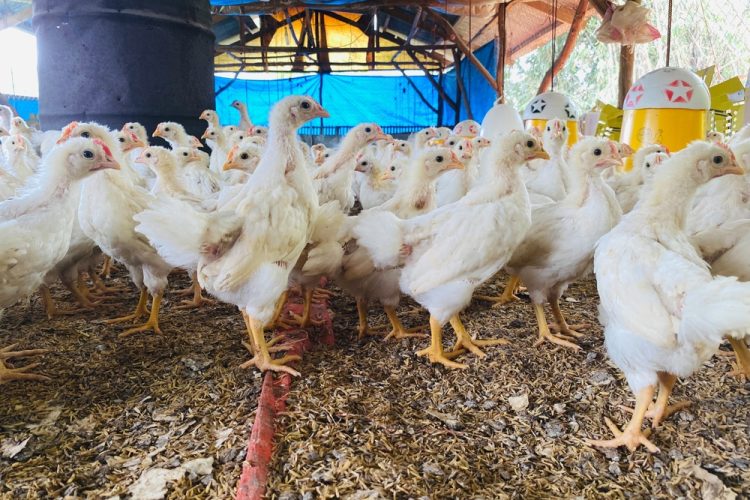The Government’s upcoming animal welfare strategy must confront the hidden cruelty in the UK egg industry
Posted: 21 October 2025 | Jenny Canham | No comments yet
Public Affairs Lead at the Vegetarian Society and fervent animal advocate Jenny Canham shares some home truths about the UK’s egg production industry and the simple steps that companies can take to raise animal welfare standards.


There’s a dark truth behind most of the eggs on our supermarket shelves. Currently, most eggs available to buy in the UK are party to a practice known as ‘male chick culling’. Male chicks born into the UK egg industry are killed hours after being hatched – deemed useless, given that they cannot lay eggs and are unsuitable for meat production.
At a time when the economy is struggling and consumers are having to be more cautious with spending, over three quarters of us are still willing to spend a bit more to spare chicks from being born and culled within hours.”
Consequently, approximately 45 million male chicks are culled – predominantly by gassing – as routine practice in the UK each year, after experiencing less than one day of life in an industrial farm.
Irene Campbell MP recently led a debate in the House of Commons around this issue of male chick culling, placing it firmly on the political agenda and raising awareness of a practice about which most of us are blissfully unaware.
Join our free webinar: Rethinking Listeria monitoring: faster, simpler solutions for food safety & environmental testing
Discover how modern Listeria monitoring solutions can support faster, more reliable food and environmental testing, and help elevate your laboratory’s efficiency and confidence in results.
Date: 18 March 2026 | Time: 15:00 GMT
In response to the parliamentary debate, Dame Angela Eagle, Minister of State, Department for Environment, Food and Rural Affairs, noted the unwavering public support for an end to male chick culling in the UK. “I fully recognise that there is strong public feeling on the routine culling of male chicks, as highlighted by the breadth of support that the Vegetarian Society’s “Ban Hatch & Dispatch” campaign has attracted,” she stated.
This sentiment is echoed in the results of a recent survey which shows 76 percent of UK residents would pay an extra 1p per egg to support farms that do not cull male chicks. Even at a time when the economy is struggling and consumers are having to be more cautious with spending, over three quarters of us are still willing to spend a bit more to spare chicks from being born and culled within hours.
Parliamentary support on the topic has been gaining strength throughout the year. In July, almost 30 MPs and Peers submitted a letter to the UK Government, requesting that it commit to a ban as soon as possible. MPs including Dr Danny Chambers, Maureen Burke and Josh Newbury also joined the recent debate.
And this isn’t an issue that government is unaware of. Two years ago, the Government’s own official advisory body, the Animal Welfare Committee (AWC), specifically recommended it ban male chick culling. In its 2023 recommendations, the AWC stated: “Government should make the routine culling of newly hatched chicks and turkey poults, due to their sex, illegal as soon as reliable, accurate methods for sexing eggs prior to hatch are available to be implemented in GB hatcheries.”1
This technology is now not only available, but also widely used throughout the world. Countries such as Germany, France and Austria have all implemented bans on the practice, with Italy and the Netherlands both currently phasing it out and firmly on track to ban it in the coming years.
Progress is happening further afield, too, with the US joining the In Ovo sexing technology movement. Earlier this year, US company Kipster announced it has introduced In Ovo sexing to reduce the number of male chicks born into the egg industry to be subsequently killed. It is the second company in the US to abandon this practice, demonstrating a vital step forwards in global animal welfare.
We are currently at a potentially landmark turning point for animal welfare…”
This powerful move sends a clear signal that the food industry is starting to question practices that are detrimental to animal welfare, as well as ethically indefensible, by considering whether such procedures are really necessary.
So far though, we are yet to see action in the UK.
We are currently at a potentially landmark turning point for animal welfare. Campaigners and advocates have been anticipating the long-awaited Animal Welfare Strategy, which could position the UK as a leader in animal welfare – a title currently in jeopardy – if it commits to swift action on some of the cruellest practices still legal in the UK today. This includes male chick culling.
The clock is ticking on the release of this eagerly anticipated strategy. With the strong political momentum, public support and recommendations from the Government’s own advisory body, it only seems logical that a roadmap to transition away from this outdated practice must be on the cards.
Let us hope that the Government releases an animal welfare strategy we can all be proud of, abolishing the cruellest animal welfare practices that still exist in the UK, including unnecessary and archaic male chick culling.
Meet the author


Jenny Canham is a writer and animal advocate with a background in journalism and public affairs. Her work has appeared in various media including BBC News, The Independent and The Daily Mirror. As Public Affairs Lead at the Vegetarian Society, she campaigns for stronger legal protections for animals and more sustainable food systems. With over a decade in global animal protection, Jenny uses storytelling and policy engagement to raise awareness and drive meaningful change worldwide.
Related topics
Animal Welfare, Environment, Food Safety, Food Security, Regenerative Agriculture, Regulation & Legislation, Supply chain, Sustainability, The consumer, Trade & Economy
Related organisations
Department for Environment Food and Rural Affairs (Defra), The Vegetarian Society









